Department of Epidemiology and Evidence-based Medicine
History
Learning and teaching of Fundamentals of epidemiological knowledge at Medical Faculty of St. Volodymyr Kiev University, which later (from 1921) was reorganized into Kyiv Medical Institute, began long before the creation of an independent Department of Epidemiology. High levels of infectious diseases and persistent epidemic specific to XIX – early XX century determined the need for scientific development of epidemiology and training of medical students the basics of fighting against infectious diseases. History of epidemiology teaching at Medical Faculty of Kyiv University began in 1843, when at the Department of State medical treatment, which existed during 1842 -1853 and was headed by Professor I.F. Leonov (1809-1854), along with hygiene, forensic medicine and science of nutrition teaching appeared course of epizootic diseases and medical police. Synthesis and systematic teaching of epidemiology of infectious diseases began in 1903 at the Department of Hygiene, where was organized private-docent course in epidemiology and medical statistics, and in 1906 – course of epidemiology and sanitary police. During the Civil War and subsequent years epidemiology teaching was conducted mainly at the Department of Microbiology.
Independent Department of Epidemiology at Kyiv Medical Institute was established in 1932. The first head of the Department of Epidemiology was Doctor of Medical Sciences, Professor V.O. Barykin (1932-1933), who also headed the Department of Microbiology. Shortly thereafter, he was arrested and repressed.
Throughout history of the Department of Epidemiology it headed well-known scientists, microbiologists and epidemiologists:
- 1933-1939 – Doctor of Medical Sciences, Corresponding member of Ukrainian Academy of Sciences, Professor Marko P. Neshchadymenko (graduate of Medical Faculty of Kyiv University, 1896);
- 1939-1948 – Doctor of Biological Sciences, Corresponding member of the Academy of Medical Sciences of the USSR, Professor Serhiy N. Ruchkovsky ( graduate of Medical Faculty of Kyiv University, 1914);
- 1948-1962 – Hero of Socialist Labor, existing member of the Academy of Medical Sciences of the USSR, Doctor of Medical Sciences, Professor Lev V. Hromashevsky (graduate of Medical Faculty of the University of Novorossiysk, Odessa, 1911);
- 1962-1987 – Doctor of Biological Sciences, Professor Ihor M. Morhunov (graduate of Dnipropetrovsk Medical Institute, 1936);
- 1987-2005 – Candidate of Medical Sciences, Professor Yuriy D. Hots (graduate of Kyiv Medical Institute, 1955);
- 2005 – present Head of the Department, Doctor of Medical Sciences, Professor Iryna P. Kolesnikova (graduate of Kharkiv Medical Institute).
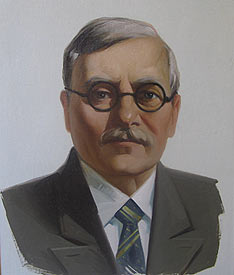
M. P. Neshchadymenko – Head of the Department of Epidemiology in 1932-1939
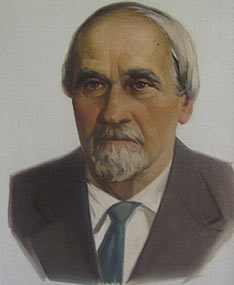
S. N. Ruchkovsky – Head of the Department of Epidemiology in 1939-1948
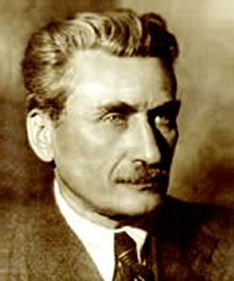
L. V. Hromashevsky – Head of the Department of Epidemiology in 1948-1962
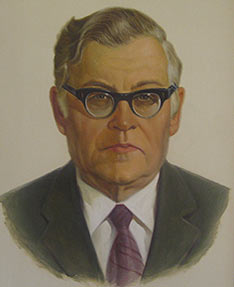
I. M. Morhunov – Head of the Department of Epidemiology in 1962-1987
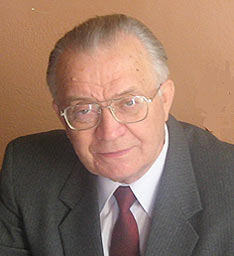
Y. D. Hots – Head of the Department of Epidemiology in 1987-2005
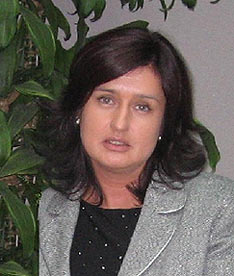
Head of the Department of Epidemiology of Bogomolets National Medical University, Doctor of Medical Sciences, Professor I.P. Kolesnikova
Among the most significant achievements of the Department of Epidemiology is impossible not to remember the following:
- BCG vaccine to immunize children was used for the first time in Ukraine, studied the effect of diphtheria toxin on the body, experimentally proved the possibility of increasing the immunogenicity of diphtheria toxoid, experimentally justified simultaneous immunization with two or more vaccines, including vaccine against smallpox and diphtheria toxoid, cholera vaccine and dysentery toxoid, thereby initiated the creation of associated vaccines (Professor M. P. Neshchadymenko);
- established natural facality of Volyn fever, which later was called “paroxysmal ricketsiosis” (Professor S.N. Ruchkovsky);
- established a doctrine of the mechanism of transmission of infectious diseases, principles of reasonable control of infectious diseases, criteria for elimination of infection (Professor L.V. Hromashevsky);
- established regulations on the mechanism of infection, which is the initial stage of interaction of pathogen and susceptible organism, studying by students of Sanitary and Hygiene Department elective lectures on immunology was introduced for the first time in the USSR, created experimental models of antroponosis infections such as shigellosis, typhoid, diphtheria, some clostridial (Professor I.M. Morhunov);
- developed the method of safe vaccination for children and medical-epidemiological technology for diagnosis and rehabilitation of sub-disease states of the organism (Professor M.M. Kolesnikov);
- developed “Information retrieval system for improving immunization for children” and “New tools of control over quality of disinfection and sterilization”, which at the exhibition of achievements of national economy were awarded bronze (1983) and silver medals (1986);
- substantiated the structural and logical framework of hierarchy of cause-and-effect relationships of epidemic process of diphtheria, established its mathematical model and compiled disease prognosis, developed method of modeling the experimental diphtheria intoxication that help adequately reproduce the mechanism of the development of temporal susceptibility to diphtheria toxin, depending on the initial level of immunity, which may explain the occurrence of illness and deaths among persons vaccinated against diphtheria (Professor M.M. Kolesnikov, Assistant professor H.A. Mokhort, Assistant professor T.V. Petrusevych);
- defined safety, immunological and epidemiological effectiveness of vaccines used now in Ukraine for the prevention of measles, rubella, mumps, pertussis, varicella; developed the concept of epidemiological surveillance of immunization controlled infections (Professor I.P. Kolesnikov, Assistant professor O. V. Zublenko and Assistant professor O.M. Semeniuk);
- created and published a number of textbooks on Epidemiology (Professors L.V. Hromashevsky, Yu.D, Hots, M.M. Kolesnikov, I.P. Kolesnikova).
During the entire period of work at the Department of Epidemiology:
-
- prepared 2 Doctors and over 50 Candidates of Sciences;
- 18 employees of the Department after defense of their dissertations were assigned to work in universities, research institutes, scientific-production association:
-
-
- Donetsk Medical Institute;
- Kharkiv Medical Institute;
- Kyiv Institute for Advanced Training;
- Research Institute of Neurosurgery;
- Chisinau Research Institute of Epidemiology;
- Kyiv Research Institute of Health Protection.
-
-
- published 15 monographs and 6 textbooks;
- received 20 invention patents and 8 international patents;
- published over 100 guidelines and bulletins.
Currently, 9 teachers work at the Department of Epidemiology, among them – 3 Doctors and 5 Candidates of Medical Sciences. Graduate students and external doctorate students perform 1 Doctoral and 5 Candidate’s dissertation.

Staff of the Department of Epidemiology at Bogomolets National Medical University
Epidemiology is taught to students of all faculties who study with the specialization in “General medicine”, “Pediatrics”, “Medical and preventive care” – 5th year of study; to students enrolled in “Dentistry” – 4th year of study, and students that are studied in “Medical and preventive care” – 6th year of study.
Practical training in Epidemiology with 6th year students (with the specialization in “Medical and preventive care”) are held at the State Institution “Institute of Epidemiology and Infectious Diseases named after L.V. Hromashevsky of the Academy of Medical Sciences of Ukraine”. These lessons are conducted by the Deputy Director for Scientific Affairs, Professor of Epidemiology, Doctor of Medical Sciences S.I. Doan, head of the Department of Epidemiology, Doctor of Medical Sciences, Professor I.P Kolesnikova, Professor of the Department, Doctor of Medical Sciences M.M. Kolesnikov. In addition, at support of Head doctor of Central SES of the Ministry of Health of Ukraine L.S. Nekrasova separate workshops also take place on the basis of this institution. They involve specialists from Central SES of the Ministry of Health of Ukraine, in particular – Head of the Unit of Epidemiology M.A. Yemets, Head of the Unit of highly infectious diseases Yu.O. Novokhatniy, Head of the Laboratory of highly infectious diseases N.B. Vydayko. Educational bases of the Department are also regional sanitary- epidemiological station and disinfection station in Kyiv.
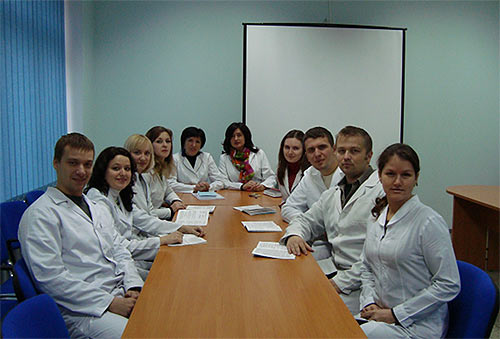
Practical training in epidemiology at the State Institution “Institute of Epidemiology and Infectious Diseases named after L.V. Hromashevsky of the Academy of Medical Sciences of Ukraine. In the center – Head of the Department, Professor I.P. Kolesnikova (on the right) and Professor of the Department S.I. Doan (on the left).
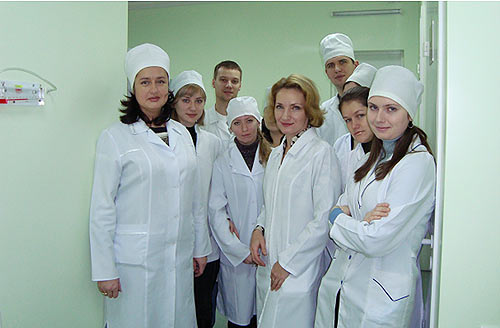
Head of the Laboratory of highly infectious diseases of Central SES of the Ministry of Health of Ukraine N.B. Vydayko (at the center) introduces 6th year students to the work of the laboratory.
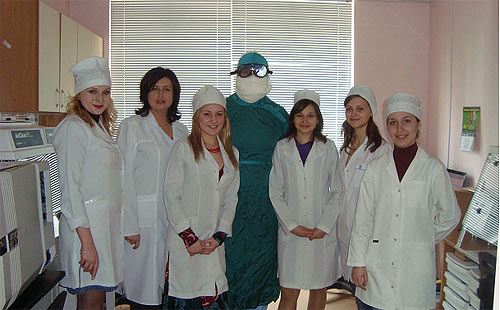
Head of the Department, Professor I.P. Kolesnikova (second on the left) with 6th year students in the practical training in the Laboratory of highly infectious diseases of Central SES of the Ministry of Health of Ukraine.
The Department of Epidemiology installed demo versions of software programs that are currently used in practice of sanitary-epidemiological service of the country; 5th and 6th year students who study within specialty “Medical and preventive care ” and interns-epidemiologists are able still during their study found the benefits of keeping automated databases, preparation of plans for preventive and anti-epidemic measures, operational and retrospective epidemiological analysis, monitoring over infectious disease, x-ray, immunoprophylaxis of children and adults. So, motivation and commitment to refuse labor-intensive manual work, while adopting new information technologies in their future work in health care institutions will be formed in future in epidemiologists.
The University at the initiative of the Rector of Bogomolets National Medical University, Corresponding member of the Academy of Sciences of Ukraine, Professor V.F. Moskalenko invites world famous scientists and epidemiologists to give public lectures. For example, Professor Robert Kim-Farley, Head of the Department of Epidemiology and Public Health of Medical Faculty of the University of California, Director of Los Angeles County Centers for Disease Control and Prevention of the Department of Public Health (USA) delivered lecture to 5th year students on the issues of the epidemiology of avian influenza.
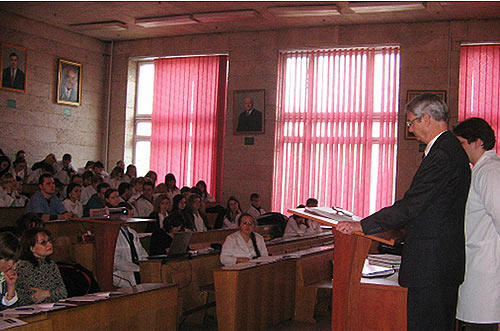
Lecture of Professor Robert Kim-Farley
Department of Epidemiology of Bogomolets National Medical University provides a backstop to profession-oriented departments of higher medial educational institutions of Ukraine (serves as All-Ukrainian training center for teaching of epidemiology). There teachers of epidemiology of higher medical educational institutions of I-IV accreditation levels improve their qualifications and 25-35 interns are annually trained.
The Department of Epidemiology has Students’ Scientific Group, whose members regularly make presentations at scientific conferences of young scientists and students’ scientific conferences, including foreign.
The main pedagogical task of staff of the Department of Epidemiology in Bogomolets National Medical University in modern conditions is to adapt teaching of epidemiology in Ukraine according to the principles of the Bologna Declaration and its methodologies.



